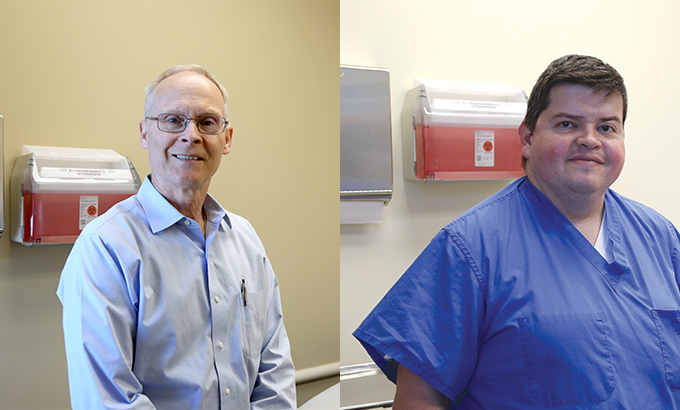
Published on August 8, 2022
How do men know if a vasectomy is right for them? Men should ask themselves and their doctor this question when considering this form of birth control.
Having a vasectomy is a personal choice, and men should take into account many factors when deciding whether or not to have this procedure.
Phelps Health Urologists Joel Leon Becerril, MD, and Geoffrey Lloyd-Smith, MD, FACS, discuss the benefits and risks of vasectomies, precautions to take and what to expect before, during and after a vasectomy.
Before a Vasectomy
Vasectomies are permanent (unless reversed) and a highly effective form of birth control, with a 99% success rate, according to Dr. Leon.
Approximately one in 2,000 vasectomies may fail, and the risk of bleeding or chronic pain in the testes is small. Only about 1% to 2% of patients experience these side effects.
A vasectomy does not immediately make a man sterile, so Dr. Lloyd-Smith urged patients who have had vasectomies to continue using protection during sex until the operation has been proven to be effective.
For men who decide to get a vasectomy, their doctor will likely recommend that they avoid taking blood thinner medications and nonsteroidal anti-inflammatory drugs (NSAIDs), like aspirin or ibuprofen, 7 days before the procedure.
During a Vasectomy
On the day of the vasectomy procedure, men should shower beforehand and try to relax.
A vasectomy is a minimally invasive procedure that usually takes place in a doctor’s office, with the patient going home the same day. “The procedure also can be done in an operating room with the patient sedated,” Dr. Leon said.
Dr. Lloyd-Smith said most vasectomies last 30 minutes to an hour. Men who have a vasectomy in a doctor’s office setting will be given local anesthesia to numb the scrotum.
A small incision is made, and the vas deferens (tubes that carry sperm from the testes to the urethra) are split. After a vasectomy, sperm cannot leave the testes or cause pregnancy.
After a Vasectomy
When patients go home after the procedure, they should lie down and relax, but they can still walk around the house. “Usually, our patients can return to work within 3 days,” Dr. Lloyd-Smith said.
Men should avoid heavy lifting, straining and strenuous physical activity for 2 weeks after a vasectomy.
“Sexual activity can resume after 2 weeks,” Dr. Lloyd-Smith said, who added that men should use some form of birth control for up to 3 months after their vasectomy procedure.
Patients who have had vasectomies are asked to take a semen analysis 3 months after their vasectomy to make sure no sperm is in their semen. Men usually take a sample at home and can bring the sample to a Phelps Health lab for testing.
Dr. Lloyd-Smith said men need to ejaculate about 15 times for any sperm cells that may still be inside the body to leave the body.
One side effect men may notice after a vasectomy is mild bruising on the scrotum.
Men also may experience 2 or 3 days of discomfort due to pressure in the testes. This discomfort may occur a few times but is rare after the first year.
Vasectomy Reversal
A vasectomy can be reversed. The reversal procedure, which also usually occurs in a doctor’s office, involves reconnecting the ends of the split vas deferens.
According to Dr. Lloyd-Smith, if a vasectomy is reversed within 10 years of the original vasectomy, most men have a 70% chance of establishing a positive sperm count again.
Is a Vasectomy Right for Me?
Dr. Leon and Dr. Lloyd-Smith encourage men to talk to their primary care provider or a urologist to determine if a vasectomy is right for them. Learn more about vasectomies in this guide.